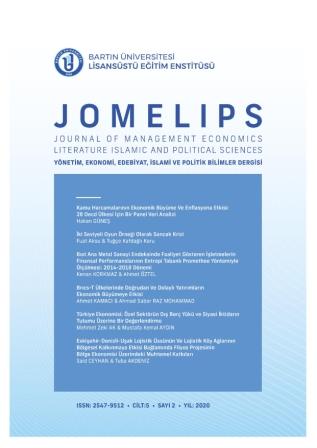İKİ SEVİYELİ OYUN ÖRNEĞİ OLARAK SANCAK KRİZİ
THE SANJAK CRISIS AS A CASE OF TWO-LEVEL GAMES
Author(s): Fuat Aksu, Tuğçe Kafdağli KoruSubject(s): Diplomatic history, Military history, Political history, Political psychology, Interwar Period (1920 - 1939)
Published by: Bartın Üniversitesi, Sosyal Bilimler Enstitüsü
Keywords: Sanjak (Hatay) crisis; two-level games; crisis management; dominant leader;
Summary/Abstract: The 1921 Ankara Agreement and herewith the situation of Alexandretta Sanjak became controversial with the decision of France to abandon the mandate management in Syria in 1936. In this case, Turkey did not assent that leaving the Sanjak to Syria and demanded that it has an autonomous government from France. Into the Sanjak Crisis was triggered by this demand, on the occasion of diplomatic initiatives of Turkey that are supported by the threat of using military force, the League of Nations’ resolutions, and the mediation of Britain; Sanjak firstly gained its independence after then was annexed to Turkey. The management process of the Sanjak Crisis was affected by the change in the international system that was moving towards the Second World War and the dominant leader profile of President Mustafa Kemal Atatürk in crisis management. While the leader, as a decision unit, negotiated with France on the international level during the crisis management process, it was also in direct communication with the Turkish Grand National Assembly (TGNA) on the national level. Although the dominant leader profile was at the forefront in crisis management, the TGNA, as the legislative branch, sometimes became a supervisory mechanism in which the executive was answerable to it, sometimes became an asset tool in which the policy followed expressed. Thus, the legislature got involved in the crisis management process. In the peaceful resolution process of the crisis and decision-making process of the leader; as a legislative branch, the TGNA has an asset function in the crisis due to the clear expression of the red line in terms of the persuasion of the opponent, the decision based on the agreed national interest, some strategic moves in crisis management and constitutional obligation reasons. The efficacy of the TGNA in the crisis was a supportive factor by influencing on Turkey's success in the crisis management process positively. This study will analyze the reasons and nature of the legislative branch's relationship with the decision-maker and the effects of this interaction on Turkey's crisis management and decision-making process in the Sanjak Crisis as a case of two-level games.
Journal: JOMELIPS-Journal of Management Economics Literature Islamic and Political Sciences
- Issue Year: 5/2020
- Issue No: 2
- Page Range: 16-56
- Page Count: 41
- Language: Turkish

